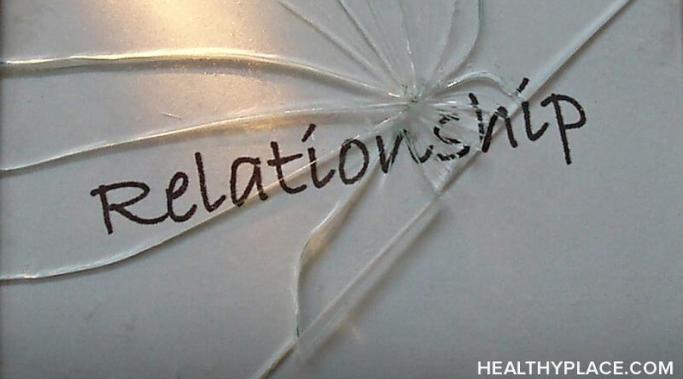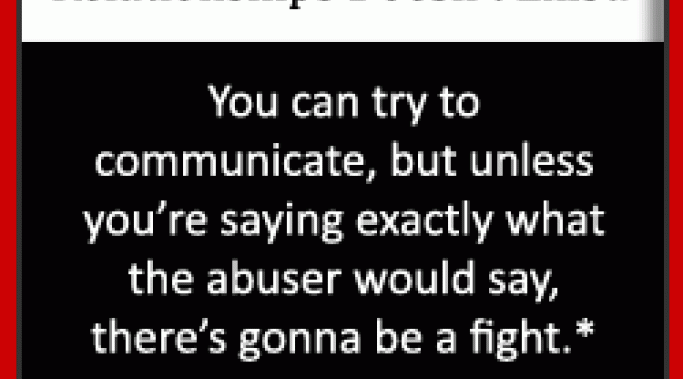This month is Teen Dating Violence Awareness and Prevention Month. Why do teens get their own month? The signs and symptoms of teen dating abuse are the same as domestic abuse, so why can't the kids just read our grown-up sites? They've always gotta be so hard-headed!
Stop Abuse
Much of the information you'll read about teen dating violence awareness this month focuses on girls and young women. If the boys and young men are mentioned, it will probably be on a page designed to help them change. As the mother of two teenaged young men (Marc and Eddie) and a survivor of domestic abuse, I feel compelled to share my perspective.
My ex-husband expertly diverted many of our arguments by accusing me of mishandling my baggage. Two examples spring to mind:
I did not ever deal with the rapes, and therefore I hated men and he couldn't talk to me,
I idolized my mother and her decision to leave my dad (for another man, in his opinion), and therefore I was not committed to our marriage and he couldn't talk to me.
Back in the day, hearing these statements led me directly into self-examination or defiance. If I told him I would think about what he said (self-exam), then I only considered his take on the matter (Do I hate men? Am I unsure of my commitment?). Of course, immediate defiance put me squarely in a defensive position, directing the argument into a series of "You always" and"You never" statements that escalated and diverted the argument from the actual topic.
I lived with an abusive man for 18 years, but truthfully, I didn't understand (or want to acknowledge) that he was abusive for 17 of them. I finally realized what was happening to me a bit more than a year before I left. During that year, I faithfully believed that he would also realize how his behaviors were affecting his family. I thought if I could somehow break through the illusion then he would see, and, more than that, he would want to change.
I failed in my efforts to change him, and that is how it is supposed to be. However, in my control-seeking quest to change my life by changing him, something remarkable happened. I changed my self. In the process, I kept track of what worked and didn't work for me. Perhaps you can identify with both my mistakes and successes.
Wouldn't it be wonderful to win an argument with your abusive spouse? How would it feel to watch their face turn thoughtful as they realize your point is valid? Wouldn't it be great if your lover admitted defeat, sucked it up, and took one for the team? Yeah!
But hey - if you're in a relationship with an abusive spouse, that's probably not going to happen. And if it does happen, if you do win one time, you will pay for it either through their silence and withdrawal, their undermining, their outright rage or some other type of abuse.
There is no such thing as winning an argument with an abusive person. But it may be more important to understand that there's really no reason to win many arguments at all.
There are ways to help someone leave an abusive relationship. You have to be careful though. Leaving an abusive relationship is very difficult, and if you are not careful, your loved one may turn on you. They may not see themselves as trapped in an abusive relationship at all. However, there is also no harm in attempting to carefully guide your loved one into realizing their partner abuses them. And, if you are wrong and the relationship is not abusive, all you've done is guide your loved one toward greater self-empowerment (and that hurts no one).
Communication in abusive relationships is like communicating with someone who cannot see or hear you and knows no word that describes the idea of someone who isn't me. When your abuser talks at you, they are talking to themselves.
Communication in abusive relationships is an all or nothing fight to the finish. Whether you're discussing the shade of towels for the guest bathroom or what elderly care facility Aunt Polly needs, the abuser expects you to say what s/he would say. Nothing more, nothing less, and definitely nothing different.
The only one who will ever attempt real communication in abusive relationships is you.
Once upon a time, I didn't realize my ex was abusive. There were many reasons and excuses for deluding myself into thinking the problem was a relationship issue, and that we were equally at fault for the trouble in the marriage.
By the time I came to terms with the fact that my ex was abusing me, that he was an abuser, I also realized that I had abused him, too. I had called him names, allowed my temper to overcome my sense, even slapped his face once and thrown keys at his head hoping my aim would, for once, be perfect.
Many people believe an abuser's anger causes the abuse in a relationship. However, an abusive person does not become angry the way "normal" people do - their rules are different. And unlike "normal" people, an abuser's anger does not cause them problems; abusive anger is one of their tools. Evidence shows that abusive men who complete anger management programs do not stop abusing. They merely choose another tool to reach the same end.
My little boys' faces lit up each Christmas morning when they saw proof of Santa's handiwork. Those memories are some of my favorites, but I can't relive the entire Christmas morning memory without including my ex-husband's scathing words "Where the hell did we get this kind of money?!"...and right there, the warm memory turns cold.
During Christmas of 1992, I was fortunate to visit the Moulin Rouge - the hang out of one of my favorite artists, Henri Toulouse-Lautrec. Although I was going for the art, most of the tour group went for the show consisting of countless scantily clad women - a show I was uncomfortable with attending but thought it worth it to soak in the call-girl atmosphere Henri so enjoyed in his day.
As I buttoned my gorgeous purple pant-suit, my husband said, "Your butt is getting wide."









